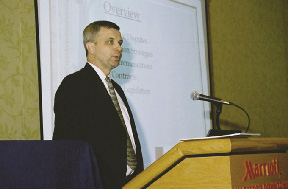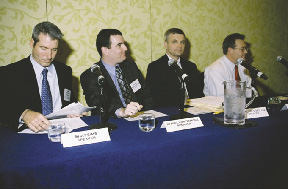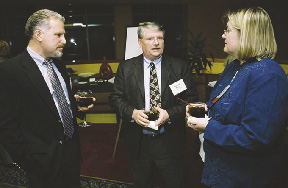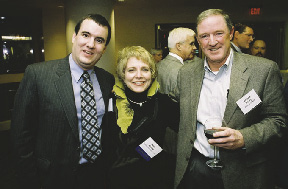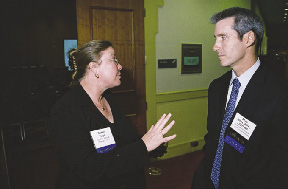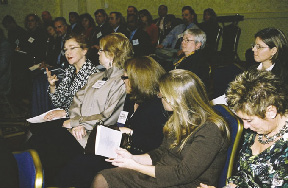On Tuesday, September 15, more than 130 professionals from the Connecticut commercial real estate industry convened at the Hartford Marriott Downtown for The Real Estate Exchange's annual State of the State of Real Estate program. The evening began with cocktails, networking and hors d'oeuvres, followed by a presentation by featured speaker Joan McDonald, the commissioner of the Connecticut Department of Economic and Community Development (DECD). Commissioner McDonald has led DECD since spring of 2007, has chaired the board of directors of Connecticut Innovations since spring of 2008 and serves on the boards of directors/trustees of the Connecticut Development Authority (CDA), the Connecticut Housing Finance Authority (CHFA) and the University of Connecticut. She has been honored as the Public Servant of Leader of the Year by Connecticut Technology Council and Connecticut United for Research Excellence, and she was recognized as one of the 2009 Remarkable Women in Business by the Hartford Business Journal. Given her extensive background in government and the private sector in strategic planning, economic development, transportation operations and public finance, commissioner McDonald was uniquely qualified to create a comprehensive strategic ecomonic development plan for the state of Connecticut. Under commissioner McDonald's watch, the DECD has been reorganized into three primary areas: policy and planning, economic development and responsible growth. The responsible growth piece encourages concentrated development around transportation nodes and infrastructure.
Commissioner McDonald began her presentation by acknowledging the "storm clouds" that have hovered over the state during the worst economic recession in years and the devastating effect that the recession has had on individuals as well as on society as a whole. However, commissioner McDonald also pointed out that she often communicates with economists, the most optimistic of whom have told her that they believe that the worst is behind us.
Commissioner McDonald stated that the business community has pointed to Connecticut's high business costs as having had a negative impact on business and industry in the state. However, she offered encouragement in this area and highlighted a number of projects to which the DECD has provided funding, including a mixed-use development at 410 Asylum St. in Hartford, the remediation of 80 brownfield sites since 2005 and the new Mort and Irma Handel Performing Arts Center at the University of Hartford. Commissioner McDonald touted a recent change to state law that will facilitate the redevelopment of mill sites throughout the state into housing or mixed-use developments. In addition, commissioner McDonald described how the DECD has been instrumental in promoting a range of housing for Connecticut residents by highlighting its role in funding a 91-unit senior housing facility across from the UConn Health Center.
Commissioner McDonald concluded by stating that she was "encouraged" by the economic development that is occurring and that studies have shown that Connecticut is the sixth most prepared state in the country for a new economy.
The feature presentation was followed by a panel discussion moderated by The Real Estate Exchange's program committee chair, Janet Wheeler. Barry Rosa, vice president and director of the New Homes & Land Division at Prudential Connecticut Realty, led off with a presentation on the state of the residential real estate market in Connecticut. In 2009, he stated, the "spring market" for residential real estate began in May rather than in January as it typically does. This delay reflected a "lack of financing ability", according to Rosa. Condominium sales are currently running about 70% of 2008 levels and single family home sales are currently running about 82% of 2008 levels. The first time home buyer tax credit has been a boon to the industry and, in many ways, has kept residential real estate sales afloat. Rosa stated that he believes that sale prices will eventually return to a modest - more "normal" - annual appreciation.
James Wakim, chief operating officer and executive vice president of The Simon Konover Company and the Connecticut state director for the International Council of Shopping Centers (ICSC), followed Rosa with insights into the retail industry. Wakim acknowledged that retailers are in a "period of transition" and that, understandably, consumer confidence must improve for many retailers to survive. Robert Winchester, president of the Waterford Hotel Group LLC, continued with his take on the hospitality industry. He acknowledged that the news was not entirely positive - the numbers show that the supply of hotel rooms continues to increase while demand is decreasing. Currently, Winchester said, the challenge for those in the hospitality industry is sustainability. Many hoteliers have looked to cut costs but have run into a conundrum: if they lower room rates, their profits are at a significant risk. In addition, financing terms - if financing is available at all - are much less favorable then they were just a few years ago. The final panelist, Thomas York, first vice president at CB Richard Ellis, focused on the office rental market. York stated that commercial tenants are reluctant to make long term decisions and are frequently asking for less space and shorter term leases. However, as York pointed out, many commercial landlords are offering enticing concession packages. "There are some terrific deals to be had," York said. Interestingly, York identified some statistics that showed that office rents today are similar to office rents 25 years ago. However, while rental amounts have remained steady, expenses and overhead have increased dramatically.








